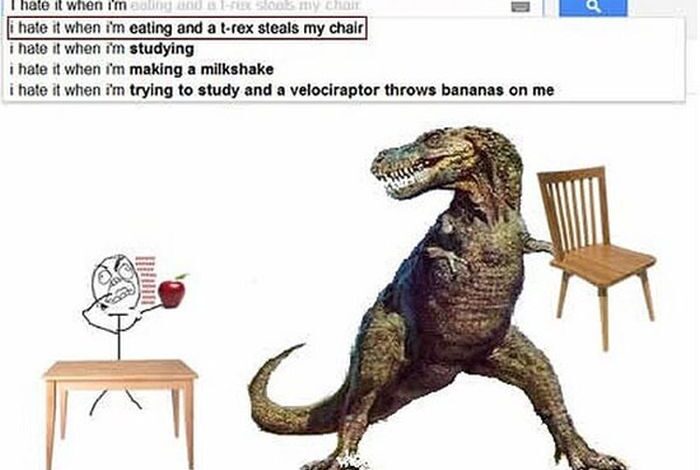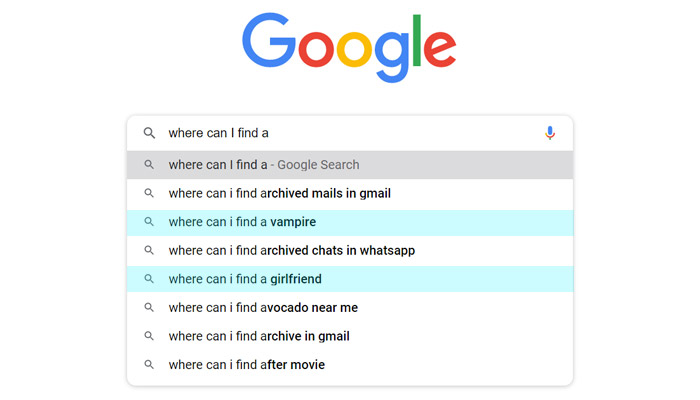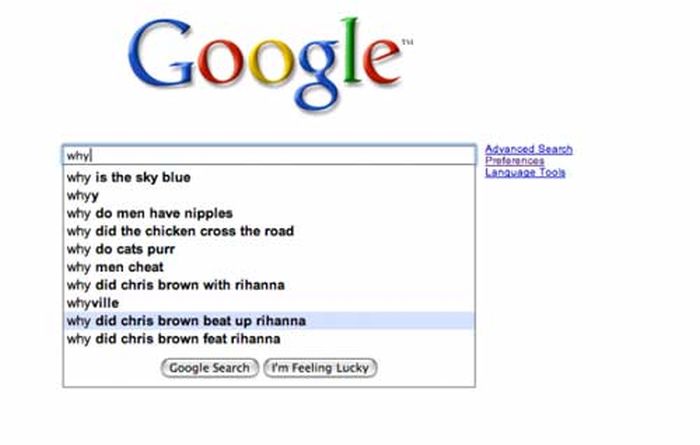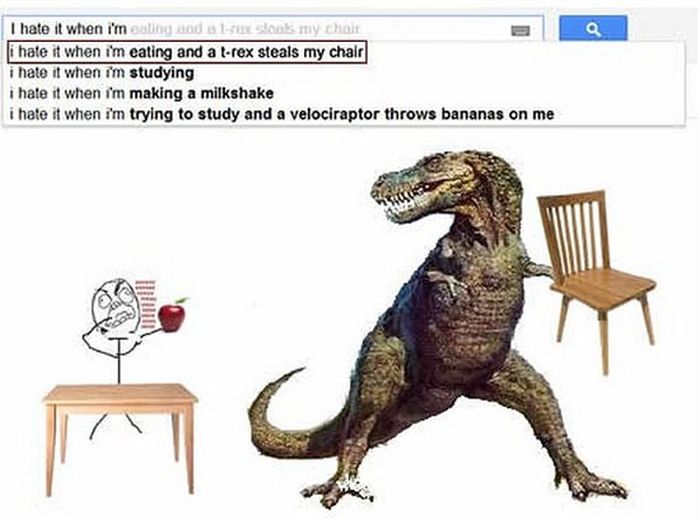
Top 10 Hilarious Google Searches
Top 10 Hilarious Google Searches – ever wondered what the funniest things people search for online are? Prepare to laugh your socks off as we dive into the bizarre, the unexpected, and the downright silly queries that flood Google’s servers daily. We’ll explore the trends, the psychology behind the humor, and even the role of autocomplete in this comedic digital landscape.
Get ready for a wild ride!
From accidental puns to searches born out of pure absurdity, we’ll uncover the hidden humor in our collective online curiosity. We’ll analyze the types of humor, explore how cultural context shapes our perception of what’s funny, and even peek into the motivations behind these hilarious searches. Think you know what’s funny? Prepare to be surprised!
Identifying Hilarious Search Trends
The internet, a boundless ocean of information, also harbors a treasure trove of unintentionally hilarious Google searches. These queries, often born from genuine curiosity, typos, or moments of sheer absurdity, offer a fascinating glimpse into the collective human psyche. Analyzing these trends reveals not only what makes us laugh but also how we interact with technology and information seeking.
Understanding the humor behind these searches requires looking beyond the surface. It’s about recognizing the unexpected juxtapositions, the grammatical mishaps, and the sheer bewilderment that often fuels these queries. By examining common themes, unexpected terms, and the evolution of these searches over time, we can gain a better understanding of this unique digital phenomenon.
Common Themes in Humorous Google Searches
Certain themes consistently emerge in the realm of humorous Google searches. These themes often reflect universal human experiences, anxieties, and curiosities, adding a layer of relatability to the inherent humor.
- Animal Mishaps: Searches involving animals behaving unexpectedly (e.g., “why is my cat staring at the wall,” “dog ate my homework – what to do”).
- Existential Crises: Questions about the meaning of life, often expressed in a comedically blunt manner (e.g., “is my life a simulation,” “what if I’m the only person who exists”).
- Bodily Functions: Searches relating to unusual or embarrassing bodily functions, often tinged with self-deprecating humor (e.g., “why do I smell like cheese,” “how to remove a stuck fart”).
- Strange Culinary Inquiries: Questions about unusual food combinations or cooking mishaps (e.g., “can I microwave a potato in aluminum foil,” “is it okay to eat expired mayonnaise”).
- Technological Troubles: Searches reflecting frustration with technology, often expressed in creative, albeit inaccurate, terms (e.g., “my computer is possessed,” “how to un-delete a deleted file”).
- Pop Culture References: Searches inspired by popular culture phenomena, often misinterpreting or exaggerating the original context (e.g., “how to become a Jedi,” “where to buy a flux capacitor”).
- Relationship Conundrums: Searches exploring the complexities of relationships, often with a humorous spin (e.g., “how to tell if your partner is a robot,” “my boyfriend’s cat hates me – help”).
- Accidental Poetry: Typographical errors leading to unexpectedly poetic or nonsensical search terms (e.g., “I love you too much words,” “what is the meaning of life in a nutshell”).
- Unintentional Double Meanings: Searches that have unintentionally humorous double meanings due to wordplay or ambiguous phrasing (e.g., “how to make a bomb cake,” “where to find a good plumber”).
- Philosophical Ponderings: Searches that delve into existential questions in a lighthearted and sometimes absurd way (e.g., “what if the earth is flat and we’re all living in a giant bowl of soup,” “why are we here?”).
Unexpected Search Terms Related to Everyday Situations
The humor in many Google searches lies in the unexpected juxtaposition of everyday situations and the search terms used to address them. These searches often reveal the creative problem-solving skills (or lack thereof) that people employ when faced with the mundane.
- “How to get cat hair out of soup” – A relatable problem with a surprisingly specific search query.
- “Why is my toast singing?” – A humorous take on a common kitchen appliance malfunction.
- “My dog ate my will – legal implications” – A high-stakes situation with a darkly comedic search term.
- “How to remove a squirrel from my pants” – An absurd but surprisingly common search, demonstrating the unpredictability of everyday life.
- “Is it normal to talk to my plants?” – A question that many secretly wonder, but few dare to openly admit.
Evolution of Humorous Search Queries Over Time
The evolution of humorous search queries reflects changes in technology, culture, and the way people interact with search engines. Early humorous searches were often simpler, focusing on typos or misspellings. As technology advanced, and internet culture evolved, the humor became more sophisticated, incorporating memes, inside jokes, and pop culture references.
For example, early searches might have included simple misspellings. Now, searches reflect a more nuanced understanding of internet humor, often involving elaborate scenarios or fictional characters. This shift highlights the increasingly complex relationship between humans and technology, with search engines acting as both a source of information and a reflection of our collective consciousness.
Humorous Search Trends Across Age Groups
Different age groups exhibit distinct patterns in their humorous Google searches, reflecting generational differences in humor, technology use, and cultural experiences. Younger generations, for example, are more likely to use internet slang and memes in their searches, while older generations might focus on more practical or relatable concerns.
| Age Group | Top 3 Search Terms | Frequency | Example Search |
|---|---|---|---|
| 18-24 | Memes, Viral Trends, Pop Culture References | High | “How to do the Renegade dance” |
| 25-34 | Relationship Advice, Parenting Tips, Career Changes | Medium-High | “Is it normal to hate my in-laws?” |
| 35-44 | Home Improvement, Recipes, Health Concerns | Medium | “How to unclog a drain naturally” |
| 45+ | Travel Destinations, Nostalgia, Health Information | Low-Medium | “What year was the first moon landing?” |
Analyzing the Humor in Google Searches

Source: piccle.in
The sheer volume of Google searches provides a fascinating window into the collective psyche, and within that vast sea of queries lies a surprising amount of humor. Analyzing these funny searches reveals not only what makes us laugh but also offers insights into current trends, cultural shifts, and the inherent absurdity of the human experience. The humor isn’t always intentional; often, it arises from the unexpected juxtaposition of words, the inherent silliness of certain questions, or the relatable frustrations we express through our searches.The types of humor found in top hilarious Google searches are diverse and reflect the multifaceted nature of comedy itself.
Puns, for example, are prevalent, relying on the multiple meanings of words to create a playful effect. Irony is another common element, with searches highlighting the contrast between expectation and reality. Absurdity, often stemming from the bizarre or nonsensical nature of some questions, is a significant contributor to the comedic effect. Beyond these core types, we also find wit, sarcasm, and even dark humor represented in the often-unfiltered world of Google searches.
Humor Styles in Animal and Technology Searches
A comparison of humor styles in searches related to animals versus technology reveals interesting differences. Animal-related searches often lean towards the cute, the absurd, and the anthropomorphic. Think of searches like “why do cats stare into nothingness” or “do dogs dream of bacon?” The humor here arises from projecting human emotions and behaviors onto animals, creating a charmingly silly effect.
In contrast, technology-related searches tend towards irony and self-deprecating humor. Searches like “how to fix my computer when it’s clearly possessed” or “why is my wifi so bad it’s making me question my life choices” tap into the universal frustrations of dealing with technology, making the humor relatable and often darkly comedic.
Cultural Context and Humor in Google Searches
Cultural context significantly shapes the humor perceived in Google searches. What’s considered hilarious in one culture might be completely incomprehensible or even offensive in another. Humor often relies on shared cultural references, inside jokes, and a common understanding of social norms. A search that’s funny within a specific cultural context might be entirely meaningless to someone outside of it.
So, I was compiling a list of top 10 hilarious Google searches – you know, the kind that make you wonder what people are really thinking? Anyway, it got me thinking about how much weird stuff people search for, which reminded me of how to actually monetize that craziness. That’s where learning how to effectively use YouTube comes in, check out this great guide on getting it on with YouTube to boost your content.
Then, back to those hilarious searches, I found one about “why do cats stare at walls” – a classic!
For example, a search referencing a popular meme or a culturally specific event would only be funny to those familiar with that context. This highlights the importance of considering cultural background when analyzing the humor in Google searches.
Examples of Hilarious Google Searches and Their Comedic Styles
Here are five examples of Google searches demonstrating different comedic styles:
- “Why is my cat judging me?”This search exemplifies anthropomorphic humor, finding comedy in the human tendency to project human-like qualities onto pets. The inherent silliness of a cat passing judgment adds to the comedic effect.
- “How to survive a zombie apocalypse with only a stapler?”This search showcases absurd humor, finding comedy in the unlikely and improbable scenario. The juxtaposition of a mundane office supply and a catastrophic event creates a humorous incongruity.
- “Is it possible to accidentally invent a new element?”This search demonstrates ironic humor. The very question implies a level of accidental scientific brilliance that is both unlikely and funny.
- “Why did the chicken cross the playground?”This search is a classic pun, playing on the familiar “chicken crossing the road” joke. The change of location adds a slightly unexpected twist.
- “How to tell if my dog is plotting my demise?”This search combines dark humor and anthropomorphism, finding comedy in the darkly humorous idea of a pet plotting revenge. The relatability of pet owner anxieties adds to the comedic effect.
Exploring the Psychology Behind Humorous Searches
The seemingly simple act of searching for humorous content on Google reveals a fascinating glimpse into the human psyche. It’s more than just a quest for a chuckle; it’s a complex interplay of motivations, emotional needs, and societal reflections. Understanding these underlying psychological drivers offers valuable insight into our online behavior and the cultural landscape we inhabit.The motivations behind seeking humorous content online are multifaceted.
Often, it’s a direct response to stress or negative emotions. Humor serves as a coping mechanism, a temporary escape from the pressures of daily life. A quick search for “funny cat videos” or “epic fails” can provide a much-needed dose of levity, momentarily shifting focus from anxieties and worries. Conversely, the search for humor can also be driven by a desire for social connection.
Sharing funny content with friends and family strengthens bonds and fosters a sense of community. The act of searching itself can be a social act, reflecting a desire to participate in shared cultural experiences and trends.
Emotional Responses to Funny Search Results
Exposure to humorous content online triggers a cascade of positive emotional responses. Laughter, of course, is central, releasing endorphins and promoting feelings of well-being. This physiological response reinforces the behavior, making us more likely to seek out humor in the future. Beyond laughter, funny search results can evoke feelings of joy, amusement, and even relief. The temporary escape from negative emotions provides a sense of psychological restoration, leaving users feeling refreshed and more positive.
Conversely, the failure to find humor in a search can lead to frustration or disappointment, highlighting the importance of the user’s individual sense of humor and the algorithm’s ability to accurately predict it.
Humorous Searches vs. Informational Searches: A Psychological Comparison
The psychological processes involved in searching for humorous content differ significantly from those involved in seeking information. Informational searches are typically goal-oriented, driven by a need to acquire knowledge or solve a problem. They often involve a degree of cognitive effort and focus. Humorous searches, on the other hand, are often more impulsive and recreational. They are driven by a desire for emotional gratification rather than intellectual fulfillment.
The emotional reward system is heavily involved in humorous searches, while informational searches primarily engage the cognitive system. The former prioritizes immediate emotional satisfaction, while the latter focuses on long-term knowledge acquisition.
Humorous Searches as Reflections of Societal Trends and Cultural Values
The types of humorous content people search for often reflect prevailing societal trends and cultural values. For example, the popularity of searches related to specific memes or internet challenges indicates the shared experiences and interests of a particular generation or demographic. Similarly, the types of jokes or comedic styles that resonate with searchers provide insights into evolving humor sensibilities and changing social norms.
A surge in searches related to political satire, for example, may reflect a society’s growing engagement with political discourse or a need to process complex political events through humor. The enduring popularity of certain types of humor, such as slapstick comedy or observational humor, speaks to the consistent appeal of certain archetypes and comedic tropes across cultures and time periods.
Analyzing search trends for humorous content can, therefore, provide valuable insights into the cultural zeitgeist and evolving social values.
Illustrating Humorous Search Results

Source: acidcow.com
Let’s dive into the visual and textual elements that make humorous Google search results so engaging. We’ll explore some hypothetical examples, showcasing how text, images, and overall design contribute to the comedic effect. Think of it as a peek behind the curtain of Google’s algorithm – a glimpse into the humorous side of search.
The humor in search results isn’t just about the query itself; it’s also about how Google presents the information. A well-designed results page can amplify the inherent humor, while a poorly designed one can dampen it. We’ll examine both the textual and visual aspects to illustrate this point.
Hypothetical Humorous Google Search Results, Top 10 hilarious google searches
Here are five hypothetical, humorous Google search results, imagining how they might appear on a Google Search Results Page (SERP).
- Search Query: “Why do cats stare into the void?” Result: A picture of a cat staring intently at a blank, white wall. The image is slightly blurry, adding to the surreal effect. The text below reads: “Experts are still baffled. Some theorize it’s an advanced form of meditation. Others suspect they’re plotting world domination.
Probably both.” The font is a playful, slightly rounded sans-serif like Comic Sans, but in a slightly more sophisticated variant.
- Search Query: “How to speak fluent dolphin”. Result: A picture of a dolphin wearing a tiny scuba mask and giving a thumbs-up. Text: “Step 1: Find a really understanding dolphin. Step 2: Develop telepathic abilities. Step 3: Good luck! (Seriously, we don’t know either.)” Font: A playful script font with slight wave effects.
- Search Query: “Is my dog judging me?” Result: A picture of a dog with its head tilted slightly, one eyebrow raised. The image is high-resolution and expertly lit, creating a humorous contrast with the somewhat silly query. Text: “Probably. But secretly, it loves you anyway…mostly.” Font: A clean, simple sans-serif like Helvetica.
- Search Query: “Recipes for squirrel stew”. Result: A cartoon image of a squirrel wearing a chef’s hat, looking nervously at a pot. Text: “We’re not sure we can help you with this one. Maybe try ‘recipes for rabbit stew’ instead?” Font: A bold, slightly whimsical serif font.
- Search Query: “How to train a squirrel to do taxes”. Result: A series of four small, progressively more complex diagrams showing a squirrel attempting to use a calculator and filing paperwork, ending with a squirrel wearing a tiny suit and tie looking stressed. Text: “Highly improbable. Consult a professional accountant instead.” Font: A minimalist sans-serif, keeping the focus on the diagrams.
Types of Humorous Image Results
The visual aspect is crucial. Let’s explore three distinct types of humorous image results.
- Unexpected Juxtaposition: An image combining two completely unrelated elements in a surprising and funny way. For example, a picture of a fluffy kitten wearing a tiny hard hat while working on a skyscraper. The humor comes from the unexpected contrast between the cute kitten and the serious construction setting.
- Meme-Based Humor: Images using popular meme formats to create a humorous context related to the search query. For instance, a “Drakeposting” meme where Drake is choosing between a straightforward, factual answer and a funny, albeit inaccurate, one related to a query about the history of cheese. The humor is derived from the familiarity and adaptability of the meme format.
- Surreal and Absurd Imagery: Images that defy logic and expectations, creating a humorous effect through their strangeness. Imagine a search for “What’s for dinner?” resulting in a picture of a T-Rex wearing a bib and attempting to eat a plate of spaghetti. The humor lies in the unexpected and illogical nature of the image.
Hypothetical Webpage Design for Top Ten Humorous Searches
To showcase these top ten searches, the webpage needs a design that complements the humor.
The webpage would use a bright, playful color scheme – perhaps a pastel palette with pops of bright yellow and teal. The background would be a subtle, textured pattern to avoid being too distracting. The font would be a friendly, rounded sans-serif, ensuring readability and maintaining a lighthearted tone. Each search query would be displayed prominently, possibly with a large, playful icon related to the query.
Below the query, a thumbnail of the most humorous image result would appear, linking to the full result page. The layout would be clean and uncluttered, focusing on the visual elements and making it easy to browse the top ten searches. A consistent design language, using playful animations and transitions, would enhance the user experience and contribute to the overall comedic effect.
The Impact of Autocomplete Suggestions
Google’s autocomplete feature, while incredibly helpful for quickly finding information, also acts as a surprisingly fertile ground for humor. It subtly shapes our searches, often leading us down unexpected and comical paths, revealing the collective absurdity of our online queries. The suggestions themselves can be funny, and the way they subtly influence our search terms adds another layer of comedic potential.Autocomplete suggestions significantly contribute to the humor found in Google searches by offering unexpected and often absurd completions to partially typed queries.
This can highlight the strange and sometimes illogical things people search for, creating a humorous contrast between the intended search and the suggested alternatives. For example, typing “why is my cat” might yield suggestions like “why is my cat sleeping so much,” “why is my cat staring at the wall,” or even the more outlandish “why is my cat judging me.” The inherent absurdity of these options, juxtaposed against the presumably serious initial query, creates an immediate comedic effect.
Autocomplete’s Influence on Humorous Search Queries
The predictive nature of autocomplete can directly influence the direction of humorous search queries. By presenting users with a range of often unexpected and quirky suggestions, autocomplete can subtly steer searches towards more humorous avenues. A user initially searching for something mundane might find themselves clicking on a humorous autocomplete suggestion, leading to a completely different and unexpected search result.
This unexpected detour is a key component of the humor; the playful disruption of the original intent. For example, someone searching for “best recipe for chicken” might be presented with “best recipe for chicken nuggets that taste like airplane food,” leading them down a humorous path of culinary curiosity. The suggestion itself is funny, and the subsequent search results might be even more so.
Using Autocomplete Suggestions in Humorous Storytelling
Autocomplete suggestions can serve as a fantastic springboard for creating humorous stories or sketches. The unexpected and often bizarre nature of the suggestions provides a ready-made source of comedic conflict or plot twists. Imagine a sketch where a detective is investigating a crime, and each clue is revealed through a series of increasingly absurd autocomplete suggestions. For example, the detective types “suspect’s last known location,” and the suggestions include “suspect’s last known location: inside a giant inflatable banana,” “suspect’s last known location: moon,” or “suspect’s last known location: inside a washing machine.” The escalating absurdity of these suggestions would create a comedic narrative arc, relying entirely on the unpredictable nature of autocomplete.
Examples of Humorous Autocomplete Suggestions
The following are five humorous autocomplete suggestions that could follow the relatively common search term “how to train a”:
- how to train a squirrel to steal nuts from your neighbor’s bird feeder
- how to train a goldfish to play dead
- how to train a cat to use the toilet (and not regret it)
- how to train a dragon (without burning down your house)
- how to train a Roomba to avoid the cat
Ending Remarks: Top 10 Hilarious Google Searches

Source: piximus.net
So, there you have it – a glimpse into the wonderfully weird world of hilarious Google searches! From the unexpected word combinations to the sheer absurdity of some queries, it’s clear that humor is a powerful force in our online interactions. Next time you’re searching, remember the comedic potential lurking within, and maybe even contribute to the ever-growing list of funny searches out there.
Who knows, your query might just make someone else’s day!
Q&A
What makes a Google search “hilarious”?
Humor in Google searches is subjective, but often involves puns, unexpected word combinations, ironic queries, or searches reflecting absurd situations or questions.
Are there age differences in what people find funny to search?
Absolutely! Younger generations might find different things funny than older generations, reflecting shifts in pop culture and humor styles.
How does Google use this data?
While Google doesn’t publicly share specifics, this data likely informs algorithm improvements, content suggestions, and understanding of user behavior and trends.
Can I see the actual top 10 searches?
Google keeps this kind of data private for privacy reasons. Our list focuses on common themes and styles within hilarious searches.
